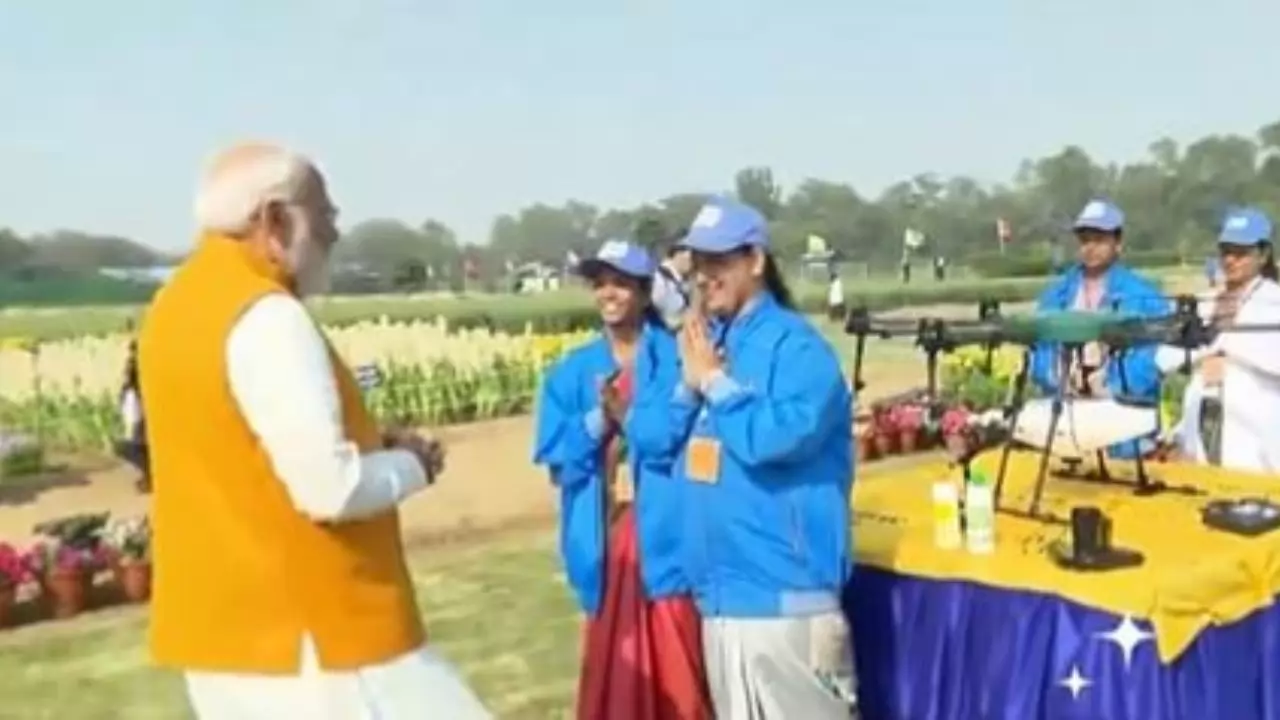
X/ANI
Nari Shakti: PM Modi explained that the only ways a society can advance are by fostering opportunity and upholding the dignity of the Nari Shakti (power of women). He said that experiences derived from ordinary life have helped the PM to create the programs and schemes for women empowerment. For this reason, these programs can make life easier for the nation's moms and daughters.
A growing group of women from self-help groups (SHGs) who have been trained to use remote-controlled aerial vehicles (RCAVs) for agricultural purposes, known as "Namo Drone Didis," received over 1,000 drones from Prime Minister Narendra Modi on Monday, marking the cusp of a women-led technological revolution in India.
Modi highlighted the importance of Self-Help Groups (SHGs) in revolutionizing the rural economy and stated that women were at the center of all government policies.
As part of the Indian Agricultural Research Institute (IARI) in the capital's "Sashakt Nari, Viksit Bharat (Empowered Women, Developed India)" program, Modi gave ₹8,000 crore in bank loans to Self-Help Groups (SHGs) at discounted interest rates. Additionally, the Prime Minister gave SHGs a digital transfer of capitalization assistance funds valued at ₹2000 crore.
The Prime Minister had earlier seen Namo Drone Didis' drone-driven agricultural operations at an IARI demonstration farm at the Pusa complex in Delhi.
The BJP-led administration has won over female voters over the past ten years with several significant programs, including clean cooking fuel and sanitation, as well as piped water to every rural household. PM Modi remarked that women in the country are leading the way in leveraging drone technology's revolutionary impact on agriculture. He declared his unwavering belief that Nari Shakti would spearhead the nation's technological renaissance in the 21st century.
#WATCH | PM Modi at Sashakt Nari-Viksit Bharat programme in Delhi.
— ANI (@ANI) March 11, 2024
I believe that the 'Nari Shakti' can lead the technological revolution of India in this 21st century. Today, we see in the IT sector, space sector, and science sector how Indian women are making their name. In… pic.twitter.com/8hceN636PY
#WATCH | Delhi: Prime Minister Narendra Modi says, "I want to express my gratitude to the 'Nari Shakti' of the country. I would often say during my rallies that 'Nari Shakti' has decided that BJP's flag will rise high in the elections..." pic.twitter.com/xB7f2hr9RW
— ANI (@ANI) December 3, 2023
Modi informed that many initiatives have been implemented that have helped to empower the women and girls of India, and have played a part in challenging old ways. Women empowerment issues were discussed by PM Modi at the Red Fort and marked the first time that such topics were brought up by a prime minister of the nation. The women empowerment issues discussed included the provision of affordable sanitary pads, toilets for females, clean cooking fuel, piped water, and registered PM Awas Yojana homes in the names of women recipients.
PM Modi explained that certain programs have helped to change the set role of females in society and prevent female foeticide. Some of these programs included Beti Bachao Beti Padhao, ₹6,000 for expectant mothers, Sukanya Samriddhi to guarantee funding for girls' education, Mudra Yojana to support women in entrepreneurship, extension of maternity leave, free medical care, and reasonably priced medications.
The prime minister predicted that drone technology will grow rapidly in the near future, affecting everything from product delivery to medical applications. The prime minister said that he is proud that women are the first drone pilots, as they will modernize the farm industry.
PM Modi informed that India was the country with the greatest proportion of female commercial pilots worldwide. He voiced that women are leading the way in aviation, from commercial pilots to drone pilots.
From healthcare to agriculture, India's drone industry is growing quickly. Both public and commercial organizations are launching a variety of services and applications, some of which will improve last-mile delivery in remote locations. An official prediction states that investments are anticipated to exceed ₹5,000 crore over the following three years.
#WATCH | Hundreds of drones were flown by Namo Drone Didis across the country at various locations. Prime Minister Narendra Modi joined them in Delhi and also interacted with them. pic.twitter.com/hA1iu44bhs
— ANI (@ANI) March 11, 2024
According to Beej founder Rahul Kanojia, a typical agricultural drone costs ₹8–10 lakhs. Leading agri-research and agri-training institutes may now purchase agricultural drones almost for free thanks to government drone subsidies, he revealed. Beej, Kanojia's startup, provides drone-based spraying across Punjab, Karnataka, and Maharashtra on an hourly basis.
Significant incentives have been made available to organizations and farmers alike under new federal guidelines for the "Kisan Drone" program, which aims to encourage the usage of remotely piloted aerial vehicles.
Grants for advanced demonstrations up to 75% of the drone's cost are available to farmers' producer organizations. Additionally, the government would pay implementing agencies ₹6,000 per hectare if they hire drones for demonstrations instead of buying them.





Copyright © 2025 Top Indian News
